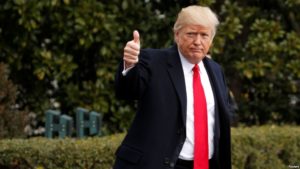Special to WorldTribune.com
Radio Free Europe / Radio Liberty
U.S. President Donald Trump has suggested he wants to strengthen the U.S. nuclear arsenal, saying the country must ensure it is “at the top of the pack” of nuclear-armed nations.
Trump, in a wide-ranging interview with Reuters on February 23, argued that the United States has “fallen behind on nuclear-weapon capacity.”

“It would be wonderful, a dream would be that no country would have nukes, but if countries are going to have nukes, we’re going to be at the top of the pack,” Trump said.
He also said that New START, a 2010 strategic-arms limitation treaty between the United States and Russia, was a “one-sided deal.”
New START stipulates that both sides must limit their arsenals of strategic nuclear weapons to equal levels by February 2018 and maintain those ceilings for 10 years.
Among other limits, it restricts each side to a maximum of 1,550 deployed nuclear warheads.
“Just another bad deal that the country made, whether it’s START, whether it’s the Iran [nuclear] deal,” Trump told Reuters in the interview. He said the United States is “going to start making good deals.”
Trump has repeatedly denounced the July 2015 deal between world powers and Iran, which imposed curbs on Tehran’s nuclear program in exchange for relief from some economic sanctions.
In the interview, he did not make clear whether he would take any action related to New START, such as withdrawing or seeking to change it.
A senior pro-Kremlin lawmaker in Russia, Aleksei Pushkov, said on Twitter that “Trump’s announcement on the expansion of U.S. nuclear potential throws strategic arms limitation agreements into question, returning the world to the 20th century.”
Another pro-Kremlin lawmaker, Vyacheslav Nikonov, told the Interfax news agency: “Trump should be aware that any efforts made by the United States to increase its nuclear missile potential will receive a symmetrical and asymmetrical response from us both in the creation of missile defense and…if we find it necessary, an increase of [Russia’s] nuclear potential beyond the limits established by [New START].”
Reuters said that Trump made his remarks about nuclear weapons in the interview when speaking about a tweet he posted in December, before taking office, in which he said that the United States “must greatly strengthen and expand its nuclear capability.”
But he did not refer directly to an expansion or buildup of the U.S. arsenal in the interview.
Asked about Trump’s comments, White House spokesman Sean Spicer said at a regular briefing later on February 23 that what Trump “was very clear on is that the United States will not yield its supremacy in this area to anybody. That’s what he made very clear in there. And that if other countries have nuclear capabilities, it will always be the United States that has the supremacy and commitment to this,” Spicer said.
But in a remark that seemed to refer to plans to expand the U.S. nuclear arsenal, Spicer said “that’s not what we’re seeking to do.”
“The question that was asked was about other people growing their stockpiles,” he said, adding that Trump has made clear “that our goal is to make sure that we maintain America’s dominance around the world, and that if other countries cloud it, we don’t sit back and allow them to grow theirs.”
In the interview, Trump also mentioned a Russian cruise-missile deployment that the United States says violated of a 1987 arms control treaty banning land-based U.S. and Russian intermediate-range missiles.
“To me, it’s a big deal,” Trump said, adding that he would bring up the issue with Russian President Vladimir Putin “if and when we meet.”
Russia has denied violating the Intermediate-Range Nuclear Forces (INF) Treaty.
Trump also put more pressure on China to solve the security challenge posed by North Korea, saying that Beijing could exert more influence on Pyongyang “very easily if they want to.”
